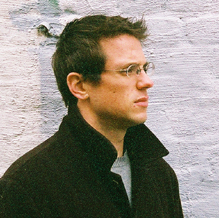 Tuesday, August 16, 2005
Tuesday, August 16, 2005
Do the new
Allan Kozin's got an astute article in today's Times that addresses the issue of "whether orchestras can find the will and the flexibility to tap into hot works when they turn up, or whether their idea of exciting programming is simply to group repertory favorites under facile thematic banners, with the occasional premiere thrown in dutifully and the word "exciting" splashed across the brochure." In particular, Kozinn is referring to 2005 Pulitzer Prize-winning composer Steven Stucky's Second Concerto for Orchestra, which he heard recently at Tanglewood. After this year's Pulitzer was awarded, there was a great deal of discussion on the issue over at Sequenza21 and NewMusicBox (whose discussion link has disappeared but is doing a nice service with the Pulitzer Sonic Gallery). Anyway, it's nice to see a reaction in the MSM:
While intending no disrespect to the Tanglewood Music Center or its superb young musicians, who produced a fantastic performance, I wondered why I had had to drive 150 miles to hear a student orchestra play it, some 17 months after a premiere that, by all accounts, was a success and four months after its Pulitzer?
Where, to put it differently, were the New York Philharmonic, the American Composers Orchestra, the Orchestra of St. Luke's, the American Symphony Orchestra and all the other orchestras that while away the musical season in a city that regards itself as the center of the musical universe? And what about orchestras elsewhere that might have picked up on the work, then brought it to New York on tour?
If you are an orchestra administrator, and you've just clucked your tongue and muttered, "He knows perfectly well that it doesn't work that way," maybe it's time to think again about how it can work, or should. Maybe now orchestras might change their tune? I'm not going to hold my breath.
posted by Brian Sacawa
7:50 PM
|
|
 Praised by The New York Times as "an inventive musician . . . fresh and surprising," saxophonist Brian Sacawa has firmly established himself as an important contemporary voice for his instrument. He is active as a soloist, recitalist, and chamber musician throughout the United States and is the co-founder of the new music duo Non-Zero with percussionist Timothy Feeney.
Praised by The New York Times as "an inventive musician . . . fresh and surprising," saxophonist Brian Sacawa has firmly established himself as an important contemporary voice for his instrument. He is active as a soloist, recitalist, and chamber musician throughout the United States and is the co-founder of the new music duo Non-Zero with percussionist Timothy Feeney.
He has given premieres of over thirty works by both established and emerging composers, including Michael Gordon, Bright Sheng, Andrew Mead, Oliver Schneller, Ken Ueno, Beata Moon, Hillary Zipper, and Scott McAllister, among many others. Named the Baltimore CITYPAPER’s Critic’s Choice for Classical Music in 2002, he is the recipient of awards for solo performance from both national and international competitions.
Sacawa's versatile career has led to appearances with the St. Petersburg Philharmonic, the Detroit Symphony Orchestra, the New World Symphony, Harvard Group for New Music, New Music Brandeis, Bargemusic, and at meetings of the ISU Contemporary Music Festival, World Saxophone Congress, North American Saxophone Alliance, and New England Saxophone Symposium.
Brian holds degrees from the University of Michigan, the Peabody Conservatory, and the University of Massachusetts – Amherst, where he studied with Donald Sinta, Gary Louie, and Lynn Klock. He has recorded for the Equililbrium, Naxos, and BiBimBop recording labels.
See Brian's other blog
Sounds Like Now
| |



